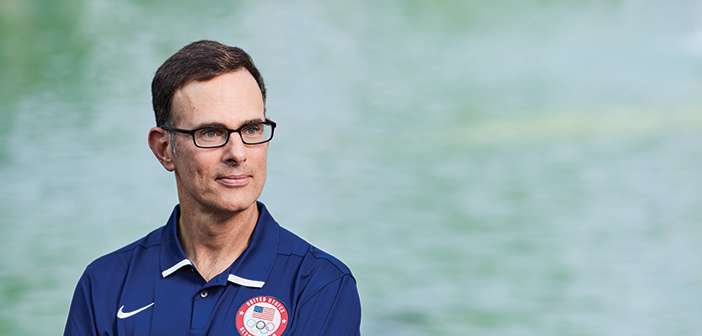In his 31 years in the Army, Jim Lynch MD’03, P’19, completed multiple combat deployments and served alongside many fellow soldiers who were suffering invisible injuries from trauma and struggling to find effective treatment.
The National Center for PTSD says 8 million adults have post-traumatic stress disorder in a given year. This includes survivors of sexual assault and abuse, natural disasters, accidents, and other life-threatening situations, as well as combat veterans.
Lynch’s familiarity with PTSD’s powerful damage prompted the family physician to find solutions. “Many of my friends, colleagues, and patients were suffering the effects of trauma and did not respond well to standard treatment,” he says.
After leaving the military, Lynch had a new mission: to supplement traditional PTSD treatments centered on psychotherapy and medications. “There is complexity in terminology and complexity in how PTSD is diagnosed,” he says. “There are 636,000 combinations of symptoms that will get you to the diagnosis of PTSD.”
Reluctance of some PTSD sufferers to seek out psychiatric care or take long-term medication led Lynch and his peers to study supplementing traditional treatments with stellate ganglion block, which has long been used to treat chronic pain. For PTSD, Lynch says, a clinician injects a local anesthetic in a patient’s neck to enable the sympathetic nervous system (“fight or flight” response) to return to a non-anxiety state.
“A large percentage of people who come to me for stellate ganglion block are reluctant to take a medication every day,” says Lynch, whose study of SGB was published in JAMA Psychiatry in 2019. Last year the VA in Long Beach, CA, announced its plans to expand SGB’s use after demonstrating its efficacy in conjunction with psychotherapy.
There’s value in multiple clinicians working together and offering multiple therapies, Lynch says: “The answer to PTSD is not one thing, one person, or one specialty. Medicine is a team sport.”
A decade ago, Lynch embraced that love of teamwork when, after completing a fellowship in sports medicine, he became a USA Swimming and a US Olympic & Paralympic Committee physician. “It was a dream come true as a sports medicine physician,” he says.
As part of USA Swimming’s Sports Medicine & Science network, Lynch addresses everything from concussion awareness to infectious diseases to asthma. “The work we do has a huge ripple effect across USA Swimming to local programs,” he says. “It’s a rewarding way to do what I’m trained to do.” The volunteer effort sent Lynch to Rio in 2016 and Tokyo this year. The Tokyo Olympics workload included a training camp prior to the US delegation landing in Japan. The training camp, Olympic travel, and competition stage require roughly a six-week commitment.
In addition, Lynch sees patients at a private sports medicine practice in Annapolis, MD, where he also offers stellate ganglion block treatment to people suffering from PTSD. Earlier this year, he and a colleague cofounded The Stellate Institute at the practice. “A huge proportion of those Americans with PTSD are from sexual assault, rape, or childhood trauma,” Lynch says.
“Raising awareness within the military and veteran community of a useful, innovative treatment for PTSD has been my passion for over 10 years. But now I’m committed to expanding access to all trauma survivors.”
Coordinating the efforts of military groups and civilian organizations in providing education and trauma treatment is his next mission. “My hope is for our medical community to collaborate to provide better trauma-informed care as a team,” he says. “Our patients deserve that.”




